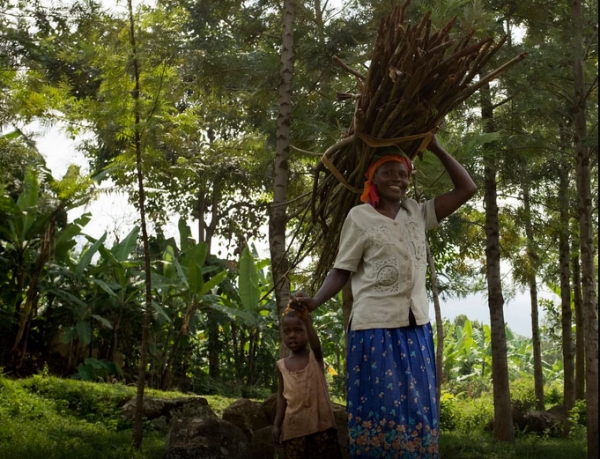Saving time, saving trees: Protecting Uganda’s mountain forests in a changing climate using fuel-efficient stoves

- By United Nations Development Programme
- View the complete article HERE
Often referred to as the Mountain of the Sun, Mount Elgon, the fourth highest mountain in East Africa, is a major catchment area that straddles the border between Kenya and Uganda. Mount Elgon National Park and the Mount Elgon Forest Reserve contain outstanding plant diversity, and the mountain is known both for its role as a vital ‘water tower’ for the region, and for its cultural significance. Natural resources play a vital role for the lives and well-being of the rapidly increasing local population.
The Bamasaba community of Nabuzo Village in Sironko District, living and growing crops on the hillsides of Mount Elgon, have a profound respect for the beauty and fragility of their mountain ecosystem, and a deep appreciation for the ecosystem services (food, water, fuel and raw materials) that their natural environment provides.
In recent years, however, torrential rains have become more common, corresponding with scientists’ predictions for a changing climate. This has combined with deforestation and cultivation on steep slopes to contribute to increased soil erosion and landslides.
PROTECTING NATURE, ENHANCING LIFE
Agnes and her husband, members of the Nabuzo Environmental Conservation group, appreciate the consonance between local development needs and conservation goals. Thanks to awareness raising activities provided by the project, they understand the need to improve management of the environment to enhance livelihoods on a sustainable basis.
Founded in 2012, the group has 76 members (45 of them women). It was originally focused on improving small scale farming on the mountain slopes, but members realised that switching to fuel-efficient cookstoves could be an additional focus for their group activity, improving air quality in their homes, and requiring less wood to be collected. This would have the additional benefit of reducing the deforestation that was contributing to landslides and soil erosion and hurting farm productivity.
EFFICIENCY ON MULTIPLE LEVELSWith support from UNDP through the Ecosystem-Based Adaptation (EbA) in Mountains Programme, the group started constructing and promoting the use of energy saving stoves.
‘Lorena’ stoves are fuel-efficient - using half as much wood as those most frequently used in rural. Lorena stoves are made from locally made, widely available materials such as mud and water. The stoves are designed to enclose the heat produced by burning wood. By enclosing the stove, smoke is drawn into the chimney pipes and then expelled from the kitchen, generating less carbon dioxide, as well as other air pollutants such as particulate matter which can cause acute respiratory and eye infections.
“We thought if we had the cook stoves we could save trees. Cutting down the trees was a problem to our nature. Soil was washed away. We are farmers. Soil erosion and landslides are difficult. Our crops will not grow if they are washed away. Now we are saving trees.” Nambazu Ambrose, Chairman, Nabuzo Environmental Conservation Group.
Climate-resilient development solutions can dramatically improve the lives of women and girls. For the women of Nabuzo tasked with collecting wood from the forest reserve, the cookstoves are changing their lives.
“My life has changed greatly. The new stove uses less wood, and we can cook all 3 pots at the same time. I used to spend the whole day gathering firewood that would only last for two days. 1 bundle now lasts 1 week with a new cookstove. I can now spend more time with my goats and farming.” – Agnes Nabusema, Nabuzo village in Sironko district, Mt. Elgon, Eastern Uganda.
By promoting innovative approaches to economic development that are socially, culturally, and environmentally appropriate, the programme has enhanced social and economic resilience for affected communities.
The global Ecosystem-Based Adaptation (EbA) in Mountains Programme is a partnership between UNDP, UNEP and IUCN, with funding from the German Government (BMUB)’s International Climate Initiative. By using sustainable management, conservation and restoration of ecosystems, as part of an overall EbA strategy, the Programme aims to reduce the vulnerability and enhance the resilience of select fragile mountain ecosystems and their local communities to climate change impacts. The promoted EbA measures carefully take into account anticipated climate change impact trends to help communities continuously adapt to a changing climate and increasing uncertainty. This global partnership also involves national and regional government agencies, civil society and local communities in three countries (Uganda, Nepal and Peru).
The activities supported by UNDP in Nabuzo Village are part of a broader suite of EbA measures supported by the Programme in Uganda. Championed by the Government of Uganda and working with the Ministry of Water and Environment, these efforts are expected to contribute to maintaining natural ecosystems, and to produce not only ecological, but also economic, social, and health benefits for the community.
For more information on the EbA work, please visit: www.undp-alm.org/projects/mountain-EbAwww.EbAflagship.org.

Facebook comments